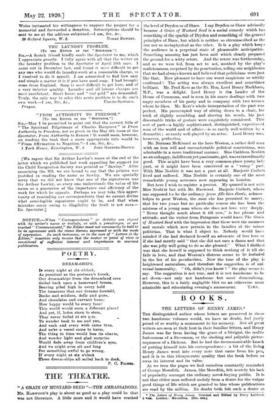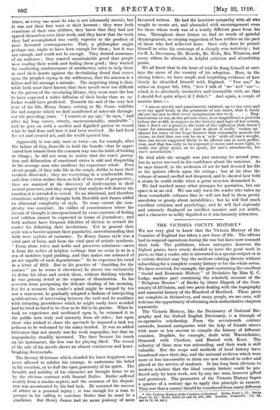BOOKS.
Ifit. LETTERS OF HENRY JAMES.*
THE distinguished author whose letters are preserved in these two handsome volumes would, we have no doubt, feel justly proud of so worthy a monument to his memory. Not all great writers are.seen at their best in their familiar letters, and Henry James was far from having the grace of a Sdvignh, the multi- fariousness of a Stevenson, or the slashing and palpable pictur- esqueness of a Dickens. But he had the-incommunicable knack of putting himself into his correspondence : a bit of the living Henry James went into every note that (same from his pen, and it is to this idiosyncratic quality that the book before us owes its interest and its value.
As we turn the pages we find ourselves constantly reminded of George Meredith. James, like Meredith, felt acutely his lack of popularity amongst the ordinary novel-buying public+. It is not that either man suffered unduly from a desire for the vulgar good things of life which are granted to him whose publications are read by the million. No doubt both felt such a desire at • The Letters of HenryJames. Selected sad Bdited by Percy Lubbock. 8 vols. London : Ys. mlliaa. we. net4 times, as every one must do who is not inhumanly ascetic, but it was not their first want or their keenest : they were both conscious of their own abilities, they knew that they had not spared themselves over their work, and they knew that the work they had accomplished was vastly superior to the product of more favoured contemporaries. That, a philosopher might perhaps say, ought to have been enough for them ; but it was not enough, and could not be enough. They desired assurance of an audience ; they wanted unmistakable proof that people were reading their words and finding them good ; they wanted the comforting reinforcement of satisfactory sales to help them to steel their hearts against the devitalizing dread that comes upon the prophet crying in the wilderness, that his mission is a failure and his message a mistake. The surprising thing is that, while both must have known that their novels were too difficult for the patron of the circulating library, they seem none the less to have expected a wider diffusion of their books than an on- looker would have predicted. Towards the end of the very last 3-ear of his life, Henry James, writing to Mr. Gosse, exhibits the sad surprise which we find manifested at intervals through- out the preceding years. I remain at my age," he says, " and after my long career, utterly, unsurmountably, unsaleable " ; and he goes on with a modest and dignified pathos to record what• he had done and how it had been received. He had lived for art and created art, and the world ignored him.
Apparently it was only once or twice—as, for example, after the failure of Guy Domville to hold the boards—that he appre- ciated how remote from the common way was his habit of looking at things ; he did not seem to realize that the exact percep- tion and delineation of emotional states is odd and disquieting to the average man who swallows his experience whole. Even clever people, if they take life in the rough, dislike to have their verdicts dissected ; they see everything in a comfortable blur, and clear vision strikes them as lack of the sense of perspective ; they are annoyed at the discovery of irrelevancies in their mental processes, and they suspect that analysis will destroy the emotion it is intended to reveal. To an abnormal, and therefore obnoxious, subtlety of thought both Meredith and James added an abnormal complexity of style. To some extent the com- plexity was essential ; the eddies of consciousness where the stream of thought is interpenetrated by cross-currents of feeling and volition cannot be expressed in terms of journalese ; and both authors have frequent felicities of diction to reward the reader for following their involutions. Yet in general their style was a barrier against their popularity, notwithstanding that both were stylists of eminence. To Henry James style was a vital part of form, and form the vital part of artistic synthesis.
Form alone takes, and holds and preserves substance—saves it from the welter of helpless verbiage that we swim in as in a sea of tasteless tepid pudding, and that makes one ashamed of an art capable of such degradations." So he expresses his creed in a letter of 1912. But in his practice of fumbling for the essence " (as he terms it elsewhere) he strove too exclusively to define his ideas and enrich them, without thinking whether be was gaining detail at the expense of illumination. In his aversion from postponing the delicate shading of his meaning, lest for a moment the reader's mind might be warped by too raw a statement, he gradually adopted a fashion of interjecting qualifications, of intervening between the verb and its auxiliary with irritating parentheses which he might easily have avoided bad he tried as hard to be clear as he did to be precise. When he took an experience and meditated upon it, he returned it to the public seen truly and intensely from all sides ; but upon those who wished to share the spectacle he imposed a task too arduous to be welcomed by the many-headed. It was an added bitterness that not merely was his work unpopular, but that its unpopularity steadily increased. The finer became his touch on his instrument, the less was his playing liked. The record of the sale of his novels shows an almost continuous and heart- breaking decrescendo.
The literary ill-fortune which clouded his inner happiness was never allowed to subdue his courage, to undermine his belief in his vocation, or to dull the open generosity of his spirit. The breadth and nobility of his character are brought home to us by the obvious contrast with Samuel Butler. Butler suffered acutely from a similar neglect, and the sourness of his disposi- tion was accentuated by his bad luck. He resented the success of others as a personal injury ; it was enough for a man to prosper in his calling to convince Butler that he must be a charlatan. But Henry James had no mean jealousy of more
favoured writers. He had the heartiest sympathy with all who sought to create art, and abounded with encouragement even for those whose work was of a totally different genre from his
own. Throughout these letters we find no words of spiteful disparagement, no carping suggestion of base artifice on the part of those who had achieved fame. Once only does he permit himself to utter his contempt of a cheaply won notoriety ; but for R. L. Stevenson, Mr. Howells, Mr. Wells, Mrs. Wharton, and many others he abounds in helpful criticism and stimulating praise.
We all know that in the hour of trial he flung himself at once into the cause of the country of his adoption. Here, in the closing letters, we have ample and inspiriting evidence of how 'closely he identified himself with England. " You see," he writes on August 6th, 1914, " how I talk of ' we' and our '— which is so absolutely instinctive and irresistible with me that I should feel quite abject if I didn't." And again, a couple of months later :-
" I am so utterly and passionately enlisted, up to my eyes and over my aged head, in the greatness of our cause, that it fairly sict%ens me.not to find every imagination rise to it. . . . Eng- land seems to me, at the present time, in so magnificent a position before the world, in respect to the history and logic of her action, that I don't see a grain in the scale of her rightness that doesn't count for attestation of it ; and in short it really ' makes up ' almost for some of the huge horrors that constantly assault our vision, to find that one can be on a side ' with all one's weight, that one never supposed likely to be offered one in such perfec- tion, and that has only to be exposed to more and more light, to make one glory more, so to speak, for one's attachment, for one's association."
He died while the struggle was just entering its second year, but he never wavered in his confidence about the outcome. As he says himself, in the orchestra of art he had devoted his life to the quieter effects upon the strings ; but at its close the volume of sound swelled and deepened, and he showed how bold a strain he could strike when a great occasion demanded it.
We had marked many other passages for quotation, but our space is at an end. We can only warn the reader who takes up these remarkable volumes that he will not find in them pretty anecdotes or gossip about notabilities ; but he will find much excellent criticism and psychology, and he will find copiously and minutely displayed an intellect massive and yet subtle, and a character as nobly dignified as it was humanly attractive.



































 Previous page
Previous page